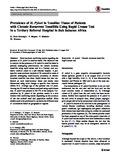Case – Control Study of Post treatment Regression of Urinary Tract Morbidity Among Adults in Schistosoma haematobium – endemic Communities in Kwale County, Kenya

View/
Date
2015Author
Magak, Philip
Chang-Cojulun, Alicia
Kadzo, Hilda
Ireri, Edmund
Muchiri, Eric
Kitron, Uriel
King, Charles H.
Metadata
Show full item recordAbstract
Previous population-based studies have examined treatment impact on Schistosoma-associated urinary tract disease
among children, but much less is known about longer-term treatment benefits for affected adult populations in areas
where risk of recurrent infection is high. In communities in Msambweni, along the Kenya coast, we identified, using
a portable ultrasound, 77 adults (aged 17–85) with moderate-to-severe obstructive uropathy or bladder disease due
to Schistosoma haematobium. Treatment response was assessed by repeat ultrasound 1–2 years after praziquantel
(PZQ) therapy and compared with interval changes among age- and sex-matched infected/treated control subjects
who did not have urinary tract abnormalities at the time of initial examination. Of the 77 affected adults, 62 (81%)
had improvement in bladder and/or kidney scores after treatment, 14 (18%) had no change, and one (1.3%) had
progression of disease. Of the 77 controls, 75 (97%) remained disease free by ultrasound, while two (3%) had apparent progression with abnormal findings on follow-up examination. We conclude that PZQ therapy for S. haematobium is effective in significantly reducing urinary tract morbidity from urogenital schistosomiasis among adult age groups, and affected adults stand to benefit from inclusion in mass treatment campaigns.
